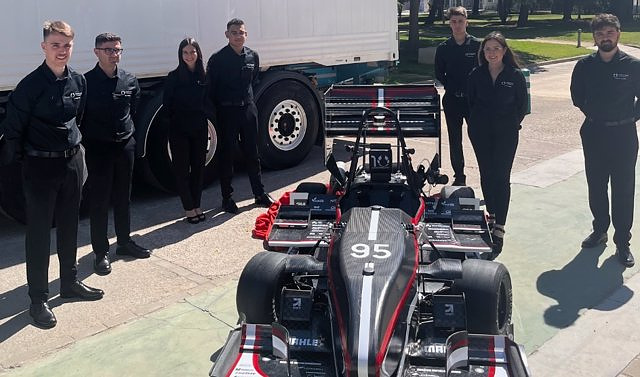VALENCIA, June 9. (EUROPA PRESS) -
The FSUPV Team, the team of the Universitat Politècnica de València (UPV), has presented this Friday its new prototype, the FSUPV-10, with which it will compete this summer in Formula Student, the most important international university competition in the field of engineering high performance, created in 1980 in the United States and landed in Europe in 1998.
The team aspires to achieve victory in Germany thanks to its autonomous driving system in the leading European competition in the field, coinciding with the last year of the combustion category at the Hockenheim circuit.
In addition to the Formula Student Germany, the FSUPV-10 will compete in Spielberg (Austria), Hungaroring (Hungary) and Montmeló (Spain), where it already won in 2021, details the academic institution.
Developed by 50 students from various UPV degrees, the FSUPV Team car incorporates an autonomous driving system with vision sensors, a processing unit and actuators that exert force on the brake, accelerator, clutch and steering wheel and that they allow the prototype to roll without a self-guided pilot.
Along with the novelty of driverless driving, the 2023 prototype incorporates other highly relevant improvements, such as an advanced real-time telemetry system, a variable aerodynamics system that improves vehicle behavior and numerous redesigns that have made it possible to lighten the single-seater. All these improvements have made it possible to see faster lap times on the track than its predecessor, the FSUPV-09, last year's prototype.
In the innovative manufacturing process of the FSUPV-10, carried out in collaboration with the Institute of Design for Automated Manufacturing and Production of the UPV, the use of molds printed on a large 3D printer, unique in the Spanish university, stands out.
"Each edition -says Joaquín Real, co-director of the FSUPV Team- in each prototype, we set new challenges, with the aim of continuing to improve, and we apply the new knowledge that we are acquiring in the UPV classrooms to do so. and in the team's workshops. For this improvement, the support of all our sponsors is also essential, which this year is already more than ninety".
After the three podiums achieved last summer, the FSUPV Team faces the season with new challenges, such as trying to climb to the top of the podium in the three competitions in which it will participate in the coming months. It focuses on the most prestigious competition at the European level, FS Germany, where it will be the last year of the combustion modality.
In any case, the first appointment will be in Spielberg (Austria), at the Red Bull Ring circuit, from July 22 to 27. In this test, the UPV team will only compete in the modality with a pilot. "It is a competition in which, despite not having a prototype specifically designed for it, we will fight for the first position," explains Lorena Borrás, Head of Image and Communication for the FSUPV Team and coordinator of the team's Electronics division.
From August 15 to 22 they will compete in Formula Student Germany, the reference competition in Europe for its history and competitiveness. It will do so at the legendary Hockenheim circuit, where after achieving first place in 2022 in the skidpad DV, this year the team seeks to compete in the autonomous driving category against the best teams in the world.
"Successfully completing the autonomous tests would put the team in a very good position against others in its category that lack a functional autonomous system, demonstrating uniqueness and the work behind the prototype," says Marc Ferrara, co-leader of the team.
Previously, the FSUPV-10 will compete in the Hungaroring, from August 1 to 5, and then in Montmeló (Barcelona), from August 7 to August 13, an event (Formula Student Spain) that poses something different to Germany. "The autonomous and piloted competitions will go separately. Our bet is to compete in both with the same car and emerge victorious," says José González, also co-director of the team.
Born in 2014, the FSUPV Team was the first team to join the UPV Spontaneous Generation, the support platform for students to carry out extracurricular activities that can facilitate their future job placement and, at the same time, serve as an example to the rest of the university community. It currently has 71 teams in which more than 2,000 people from its three campuses participate.

 Exploring Cardano: Inner Workings and Advantages of this Cryptocurrency
Exploring Cardano: Inner Workings and Advantages of this Cryptocurrency Seville.- Economy.- Innova.- STSA inaugurates its new painting and sealing hangar in San Pablo, for 18 million
Seville.- Economy.- Innova.- STSA inaugurates its new painting and sealing hangar in San Pablo, for 18 million Innova.- More than 300 volunteers join the Andalucía Compromiso Digital network in one month to facilitate access to ICT
Innova.- More than 300 volunteers join the Andalucía Compromiso Digital network in one month to facilitate access to ICT Innova.-AMP.- Ayesa acquires 51% of Sadiel, which will create new technological engineering products and expand markets
Innova.-AMP.- Ayesa acquires 51% of Sadiel, which will create new technological engineering products and expand markets Khan is re-elected mayor of London and underpins Labor's victory in local elections
Khan is re-elected mayor of London and underpins Labor's victory in local elections Felipe VI swears the flag again 40 years later at the AGM with Princess Leonor as a witness
Felipe VI swears the flag again 40 years later at the AGM with Princess Leonor as a witness Freixenet and unions agree to reduce working hours by 20-50% this year due to the drought
Freixenet and unions agree to reduce working hours by 20-50% this year due to the drought STATEMENT: Nearly 400 people participate in the II Family Support Conference at UIC Barcelona
STATEMENT: Nearly 400 people participate in the II Family Support Conference at UIC Barcelona How Blockchain in being used to shape the future
How Blockchain in being used to shape the future Not just BTC and ETH: Here Are Some More Interesting Coins Worth Focusing on
Not just BTC and ETH: Here Are Some More Interesting Coins Worth Focusing on A sensor system obtains the fingerprint of essential oils and detects if they have been adulterated
A sensor system obtains the fingerprint of essential oils and detects if they have been adulterated Faraday UPV presents the 'Origin' rocket to exceed 10 km of flight: "It is the beginning of the journey to space"
Faraday UPV presents the 'Origin' rocket to exceed 10 km of flight: "It is the beginning of the journey to space" The Generalitat calls for aid worth 4 million to promote innovation projects in municipalities
The Generalitat calls for aid worth 4 million to promote innovation projects in municipalities UPV students design an app that helps improve the ventilation of homes in the face of high temperatures
UPV students design an app that helps improve the ventilation of homes in the face of high temperatures A million people demonstrate in France against Macron's pension reform
A million people demonstrate in France against Macron's pension reform Russia launches several missiles against "critical infrastructure" in the city of Zaporizhia
Russia launches several missiles against "critical infrastructure" in the city of Zaporizhia A "procession" remembers the dead of the Calabria shipwreck as bodies continue to wash up on the shore
A "procession" remembers the dead of the Calabria shipwreck as bodies continue to wash up on the shore Prison sentences handed down for three prominent Hong Kong pro-democracy activists
Prison sentences handed down for three prominent Hong Kong pro-democracy activists ETH continues to leave trading platforms, Ethereum balance on exchanges lowest in 3 years
ETH continues to leave trading platforms, Ethereum balance on exchanges lowest in 3 years Investors invest $450 million in Consensys, Ethereum incubator now valued at $7 billion
Investors invest $450 million in Consensys, Ethereum incubator now valued at $7 billion Alchemy Integrates Ethereum L2 Product Starknet to Enhance Web3 Scalability at a Price 100x Lower Than L1 Fees
Alchemy Integrates Ethereum L2 Product Starknet to Enhance Web3 Scalability at a Price 100x Lower Than L1 Fees Mining Report: Bitcoin's Electricity Consumption Declines by 25% in Q1 2022
Mining Report: Bitcoin's Electricity Consumption Declines by 25% in Q1 2022 Oil-to-Bitcoin Mining Firm Crusoe Energy Systems Raised $505 Million
Oil-to-Bitcoin Mining Firm Crusoe Energy Systems Raised $505 Million Microbt reveals the latest Bitcoin mining rigs -- Machines produce up to 126 TH/s with custom 5nm chip design
Microbt reveals the latest Bitcoin mining rigs -- Machines produce up to 126 TH/s with custom 5nm chip design Bitcoin's Mining Difficulty Hits a Lifetime High, With More Than 90% of BTC Supply Issued
Bitcoin's Mining Difficulty Hits a Lifetime High, With More Than 90% of BTC Supply Issued The Biggest Movers are Near, EOS, and RUNE during Friday's Selloff
The Biggest Movers are Near, EOS, and RUNE during Friday's Selloff Global Markets Spooked by a Hawkish Fed and Covid, Stocks and Crypto Gain After Musk Buys Twitter
Global Markets Spooked by a Hawkish Fed and Covid, Stocks and Crypto Gain After Musk Buys Twitter Bitso to offset carbon emissions from the Trading Platform's ERC20, ETH, and BTC Transactions
Bitso to offset carbon emissions from the Trading Platform's ERC20, ETH, and BTC Transactions Draftkings Announces 2022 College Hoops NFT Selection for March Madness
Draftkings Announces 2022 College Hoops NFT Selection for March Madness
























